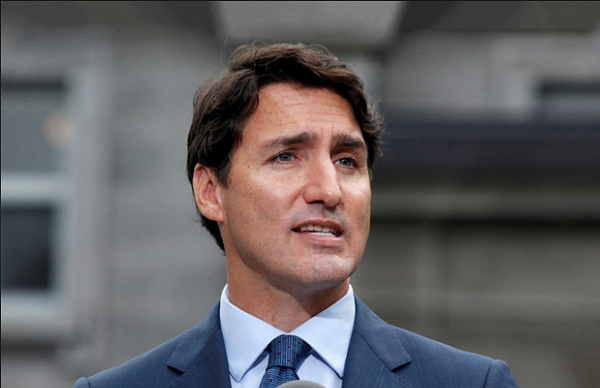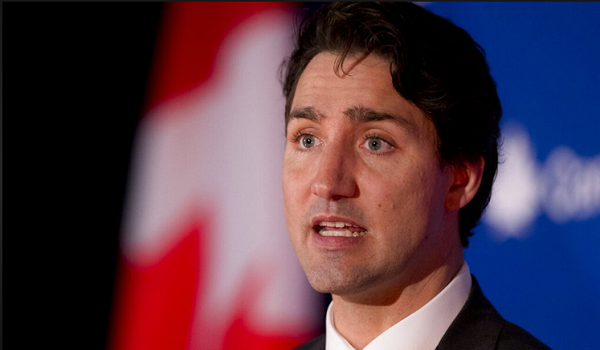Canada will respond to any new U.S. tariffs,as retaliatory measures applied in past dealing, Trudeau says
Prime Minister Justin Trudeau says Ottawa will respond to any tariffs imposed by the United States on Canadian goods, arguing that retaliatory measures were crucial to getting the Americans to back down during earlier trade spats.
U.S. president-elect Donald Trump has threatened to impose a 25-per-cent tariff on all imports from Canada and Mexico on his first day in office next month unless the two countries do more to address border security issues. He also campaigned on a promise to impose an across-the-board 10-per-cent to 20-per-cent tariff on all imports.
Mr. Trudeau told the Halifax Chamber of Commerce on Monday that tariffs at this level would have a “devastating” impact on the Canadian economy, while also damaging the U.S. economy and driving up prices for American consumers.
Ottawa would “respond to unfair tariffs in a number of ways, and we’re still looking at the right ways to respond,” Mr. Trudeau said in his most expansive comments to date on Canada’s approach to dealing with a possible trade war with the United States.
He highlighted Canada’s 2018 response to tariffs that Mr. Trump imposed on Canadian steel and aluminum products during his first presidency. Canada reacted at the time with counter-tariffs on U.S. steel and aluminum and went after specific U.S. products with targeted tariffs.
“It wasn’t that Americans were paying more for their steel and aluminum, although that was annoying to some people in the States. It was the fact that we put tariffs on Bourbon and Harley Davidsons and playing cards and Heinz ketchup and cherries and a number of other things that were very carefully targeted … [and] politically impactful to the President’s party and colleagues,” Mr. Trudeau said.
“We were able to punch back in a way that was actually felt by Americans.”
So far, Mr. Trudeau has looked to de-escalate trade tensions, rather than intensify them. He called Mr. Trump shortly after the president-elect made his 25-per-cent tariff threat on social media two weeks ago, and the Prime Minister flew down to Florida to dine with Mr. Trump later that week.
The federal government has also promised to beef up the Canada Border Services Agency and the RCMP to address Mr. Trump’s border security concerns.
It’s unclear how much these early efforts have changed the president-elect’s mind. In an interview with NBC News that aired Sunday, Mr. Trump said that tariffs “properly used, are a very powerful tool, not only economically, but also for getting other things outside of economics.”
When Mr. Trump was asked whether his tariff threats are real or mostly a negotiating tactic, he responded by noting that his social-media post spurred the dinner with Mr. Trudeau, where the two discussed border security issues.
Mr. Trudeau said in his Halifax comments that it’s important to take Mr. Trump seriously when it comes to tariff threats. At the same time, Mr. Trump often looks to “destabilize a negotiating partner, to offer uncertainty and even sometimes a bit of chaos into the well established hallways of democracies and institutions,” the Prime Minister said.
“One of the most important things for us to do is not to freak out, not to panic.”
Canada needs to show a unified response to the threats of tariffs, Mr. Trudeau added, citing his collaboration with Saskatchewan Premier Scott Moe in 2018 to counter U.S. tariffs.
Collaboration between Ottawa and the provinces has been less apparent this time around. Ontario Premier Doug Ford went out on his own to call for bilateral trade negotiations between Canada and the U.S. that sidelines Mexico. Alberta Premier Danielle Smith has criticized the federal government and said that Mr. Trudeau “hasn’t made it easy” for Canada to respond to Mr. Trump.
Mr. Trudeau said Canada is looking for a “win-win” solution to Mr. Trump’s trade and security concerns that benefit businesses and consumers on both sides of the border. However, he acknowledged that Ottawa is facing a more difficult environment than last time Mr. Trump entered the White House.
“It’s going to be a little more challenging. They’re coming in with a lot clearer set of ideas of what they want to do right away than they had last time. But we can do this.”
If it does come down to retaliation, Canada will likely follow a similar playbook to 2018, according to Steve Verheul, who was the country’s chief trade negotiator during the last Trump presidency.
“It’s really trying to target specific regions of senators or influential people and try to hit them there, which is why we went after certain types of whiskeys,” Mr. Verheul said in a webinar hosted by Bank of Montreal last week. “So it’s all based on an attempt to try to cause the maximum negative reaction in the U.S.”
He added that it’s also important not to retaliate in a way that does excessive damage to Canadian consumers and businesses, which means leaving manufacturing inputs and products that aren’t produced in Canada off the tariff list.
“Part of the problem with retaliation is the scale, because a 25-per-cent tariff across $500-billion roughly of exports from Canada is a big number, and we would have to retaliate from Canada at very high levels in order to match that, and that is always a challenge.”
This article was first reported by The Globe and Mail













